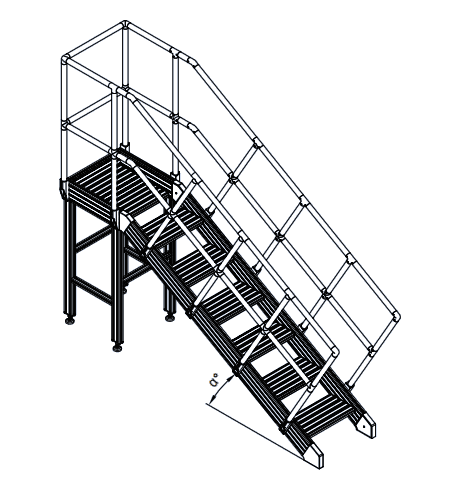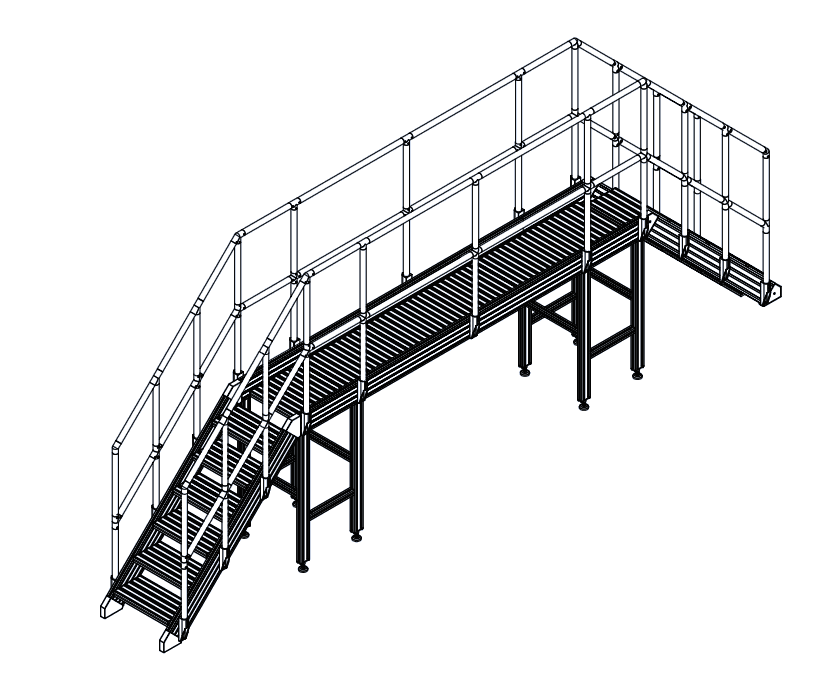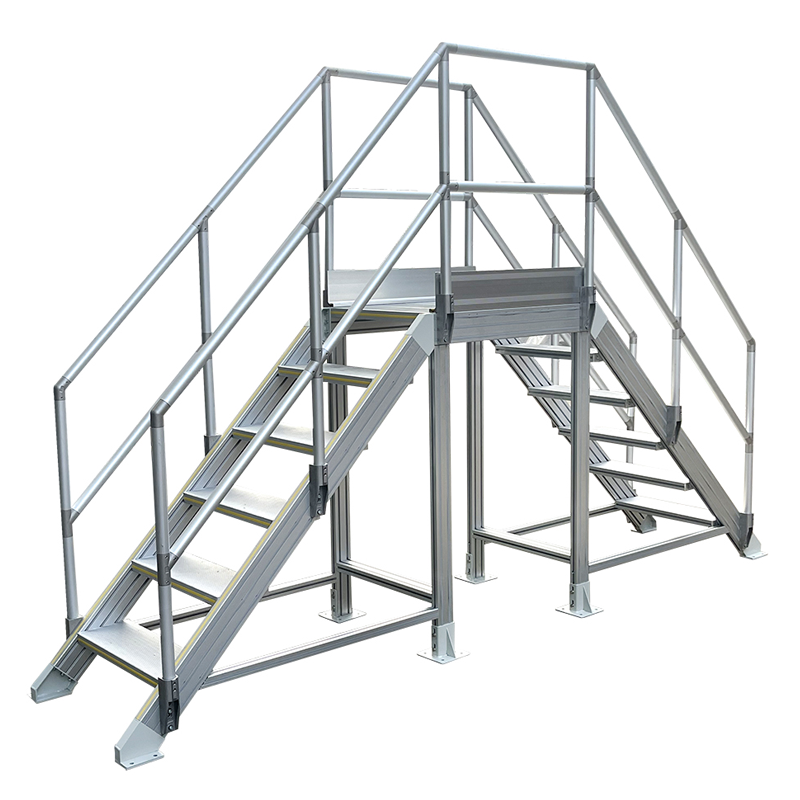Custom industrial stairs & platforms are built with durability in mind and often feature non-slip treads for operator safety. Platforms provide stable work areas and can include guardrails to prevent falls, thereby enhancing workplace safety.
Priskribo
Industrial Stairs & Platforms
Industrial stairs & platformoj, we mainly use in automated production workshops. They are the entrance and exit of equipment maintenance platforms or step and walkway systems. We can also use them for climbing operations; we generally use industrial aluminum profile step systems with maintenance work platforms, workshop work platforms, and production lines across bridges.
The platform system is connected and used together to form a complete industrial stairs & platforms system.
Industrial ladders, we also name it industrial stairs or industrial platforms. According to the characteristics of the application, we can use them for modular industrial assembly, mechanical protection, industrial steps and walking platforms, ktp. Traditional industrial ladders materials are generally stainless steel and other materials. When communicating with customers, we often hear customers complain. Stainless steel ladders are expensive, ugly, inconvenient to disassemble, and troublesome to order.
Instrustion & Selection of Angle of Inclination
Industrial stairs & platforms components are is special profiles and connectors. Due to its modular characteristics, it can be seamlessly integrated with profiles and accessories from industrial assembly systems, meeting various functionalities and angles as needed.

When α = 30°
A smaller angle makes the ascent easier. Although the travel distance is longer compared to stairs with a steeper incline, users do not have to exert as much effort in lifting their legs. This helps alleviate some pressure. We prefer this angle when there is sufficient space, and use and employ the stairs frequently for transporting heavy objects.
When α = 38°
Taking into account the length and height of the composite steps, along with the calculation of energy expenditure, researchers have found that 38° is the most ergonomically ideal slope. This angle, determined by the lifting motion of the legs and the forward lean of the upper body, aligns most closely with the natural human gait, making it the most comfortable climbing angle.
When α = 45°
We can find this angle commonly in staircases within industrial facilities. Not only does it appear aesthetically pleasing, but 45° stairs also offer numerous advantages in terms of space requirements, achievable height, and usability. Additionally, it is the angle with the highest number of standard mold connectors in our company.
When α = 60°
At the same height, climbing at this angle requires more effort, but the distance is shorter, allowing for a quick ascent. We often use this angle in situations where ground space is in limitation and usage is infrequent, such as maintenance ladders.
What Factors We Consider When Customizing Industrial Stairs & Platforms?

Reasonably Select Platform Profiles Based on Actual Load-bearing Needs
In actual use, the aluminum profile step platform needs to bear a certain weight. Different load-bearing needs require different aluminum profile specifications. For general aluminum profile steps, we can use profiles with specifications above 4040. If the span is large, we should use profiles with specifications above 8080.
Reasonably Design the Platform Shape and Stair Inclination Angle According to the Actual Site
To customize the Industrial stairs & platformoj, it is necessary to design a functional and practical step structure. And form based on the actual structural shape of the site to meet the actual functional needs. At the same time, the stairs with aluminum profile treads should have an appropriate inclination angle.
Generally, we design a suitable inclination angle based on the actual use site size, location, layout and other usage scenarios. It should not only be comfortable and convenient, but also ensure the safety of personnel. Normally, we control the bevel angle range of aluminum profile platform stairs between 45 degrees and 60 degrees.
Reasonably Design the Collapse Span and Safety and Anti-skid according to the Actual Site
Industrial stairs & platformoj, especially bridge-type steps, have to bear a certain weight. The larger the span, the more materials we use. And the larger the profile specifications are to bear the same weight. That is, we use larger specifications.
We use the more profiles for support, the greater the material cost will be. At the same time, the larger the span, the easier it is to cause bending and deformation of the aluminum profile.
In Conclusion
Therefore, when customizing the industrial stairs & platformoj, we should design a reasonable platform span based on actual use needs. Krome, in order to ensure the safety of personnel when customizing aluminum profile steps, we need install anti-skid plates on the tower stairs to prevent personnel from slipping. Generally, we choose aluminum alloy striped boards.
Product Features of Industrial Stairs & Platforms

Industrial stairs & platforms have a stable structure, are easy to move and are safe to use. They can greatly improve work efficiency and expand operating space. They are essential facilities for climbing operations in factories, warehouses, shopping malls, supermarkets and many other places.
We also use them for maintenance in the automotive and aerospace fields. We can use climbing tools as carrying tools for material handling and turnover. And as auxiliary tools for climbing to pick up goods.
- All products materials are anodize aluminum alloy, which is safer, more convenient, lighter and more beautiful;
- The base is equipped with a stabilizer to ensure the stability of the platform and safe operation;
- The entire combined platform is light and convenient, and we can easily move and positioned by only two people;
- The pedals of the climbing ladder materials are aluminum alloy striped plates to increase friction and be stable and non-slip;
- There are round tube handrails next to the steps for users to board the platform. And guardrails are provided on the other three sides of the platform to ensure the safety of operators.





